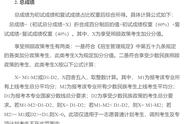at 在某处(小地方)(at the cinema; at school; at home; at the railway station)
in 在某处(大地方)(in China; in Beijing);
在--里面 (in the classroom; in the water)
on 在--上面(紧贴着其表面):
near 在---附近
beside:在--旁边
by 在--旁边
between 在--和--之间
among 在--(3者或更多的人或物)当中
in front of 在--的前面
behind 在--的后面
beside: 在—旁边
into 进入--里
out of 从--中出来
near / nest to 靠近
across 穿过(沿着表面)
through 穿过(从中间)
along 沿着
from -- to -- 从--到--
around 在--周围
over 在--的正上方
under 在--的正下面
above 在--斜上方
below 在--斜下方
其他介词in 用(某种语言),穿着(某种颜色的衣服)
about 大约;关于
from 来自 ---
as 像--(接句子); 正如--;
like 像--(接单词)
with 和--起; 用--
without 没有--
by 通过(某种方式或手段);
乘坐 by bus(train /plane /ship /bike) on foot
重要介词辨析(1)on, over与above
On 在……上面 与物体表面有接触面
Over 在……上方 垂直正上方,表示“跨越,覆盖”
Above在……上方 “在……(偏)上方”,表示两者不接触
例如:
There is a bag on the desk.
The lamp is over the table.
The heaven is above us.(苍天在上。)
(2)in, on 与to
in 用于主语被包含于某一范围之内。
on 用于表示两地互相接壤。
to 用于主语在某一范围之外。
例如:
Beijing lies in the north of China.
北京位于中国的北部。
Rusia is on the north of China.
俄罗斯在中国的北面。
Japan is to the east of China.
日本在中国的东面。
(3)across, over, through 与past
across “穿过” 强调从物体表面的这一边到另一边
over “越过” 强调从人或事物的上方经过,越过
through “穿过,通过” 强调从物体内部穿过;从长形物的一头到另一头。
past “经过” 只从物体旁边经过
例如:
If you see the green light, you can walk across the street.
The train run through the tunnel(隧道).
I can jump over the fence(围墙).
We walked past the hospital.
(4) except, except for, besides与but
except “除……以外” 表示同类事物之间的关系
except for “除……以外”,“如果不是”,“若非” 表示对局部的否定,不表示同类事物之间的关系
besides “除……以外”,“还有……” 所指事物包括在叙述范围之内
but “除……以外” 多与nobody, none, no one, nothing, anything, everyone, all, who连用
例如:
We all went swimming except Ann.
Besides Ann, we all went swimming.
Your composition is good except for some spelling mistakes.
No one but Peter went there.
(5) in front of 与in the front of “在……前面”
in front of 指一个物体在另一个物体的前方
in the front of 指一个物体包含在另一个物体内部的前方
There is a big tree in front of the classroom.
There is a desk in the front of the classroom.
频度副词是副词的一种,在初中阶段常用的有四个,即always, usually,often,sometimes。现将它们的用法归纳如下:一、频度副词在句中的位置。
频度副词在句中习惯上位于be动词、助动词之后,行为动词之前。如:
1.She is often late for school.她上学经常迟到。
2.He usually goes to bed at about 12.他通常(午夜)十二点钟睡觉。
3.When do you usually get up in the morning?早上你通常什么时候起床?
sometimes是个特殊的频度副词,既可以放在be动词、助动词之后,行为动词之前,也可以放在句首,还可以放在句尾。如:
1.I sometimes think that it is a great mistake.我有时想这是一个大错。
2.Sometimes I help my mother in the house.有时候我帮助妈妈做家务。
often可以放在句中,也可放在句尾,习惯上不放在句首。如:
We have been there quite often.我们经常到那儿去。
这些频度副词的位置与句中谓语动词有无助动词有关。句中没有助动词时,副词置于动词be之后,其它动词之前。
二、表示频度方面的区别。
always是频度最大的词,意为"总是;永远"。如:
I shall always remember my first day at school.我将永远记住我上学的第一天。
usually意为"通常",即很少例外,频度仅次于always。如:
What do you usually have for breakfast?你通常早餐吃什么?
often意为"经常",在频度上不如usually那么频繁。如:
Li Ping often does his homework in the afternoon.李平经常在下午做作业。
sometimes意为"有时候",频度比often小,表示动作偶尔发生,间断较大。如:
1.I sometimes go to the library.我有时去图书馆。
2.Sometimes I read a book in the evening.我有时在晚上看书。
三、频度副词与not连用时,表示部分否定;对频度副词进行提问时,要用how often。如:
1.A great scholar is not always a very wise man.大学者未必一定是极聪明的人。
2.We go to the cinema sometimes.(对划线部分提问)
How often do you go to the cinema?














